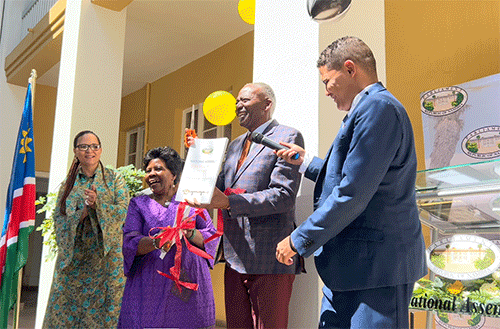An absent parliamentary service commission, lack of robust oversight, no communication strategy, limited public involvement and a poor public image are among the National Assembly’s chief shortcomings.
In the face of challenges, some strengths such as the assembly’s constitutional mandate, experienced staff, membership of international parliamentary bodies, digitisation and access to the e-Parliament do exist.
This, the NA observed while doing an introspection through a strengths, weaknesses, opportunities and threats (SWOT) analysis on its “bumpy road” towards crafting a five-year roadmap on how it endeavours to execute its mandate.
The information is contained in the NA’s strategic plan for 2023 to 2027, which was unveiled by NA Speaker Peter Katjavivi yesterday.
During the launch, he said part of their core functions is to ensure effective, efficient and affordable service delivery to the Namibian populace, while remaining a watchdog which ensures that public funds are spent prudently to meet the needs of the citizenry in their hour of need.
“Service delivery was always at the heart of the [National Assembly’s] agenda… Parliament must continuously drive this agenda of service delivery, and be the watchdog making sure that the services are delivered appropriately, and that costs are kept within the necessary bounds and not costly for our people to be able to afford the services that they need badly,” Katjavivi said.
At the heart of the parliamentary reform agenda is to improve engagement, digitisation, improve public perception, remain relevant, amend Parliamentary Standing Rules and Order, develop a framework dealing with private members’ bills, and improve relationships with civil society organisations and other key stakeholders.
“Our overarching aim remains steadfast: to bolster the National Assembly’s core functions of law-making, representation, oversight and fiscal stewardship. Parliament, as the bastion of democracy and the people’s voice, has embarked upon a strategic journey. This journey, which commenced with a meticulous environmental scan, culminated in a comprehensive strategy formulation by project identification and prudent budgeting. This plan mirrors the inherent strategic plan design followed by all the three organs of the Namibian State,” he stated.
The process started in 2020, and the Office of the Prime Minister played a crucial role in perfecting the plan.
“Initiated amidst the challenges of the Covid-19 pandemic, this plan is aligned with our national development objectives, focusing squarely on Parliament’s pivotal role in ensuring robust governance and accountability from the executive,” the veteran scholar and politician continued.
Threats
Charged with the power to pass laws with the assent of the president and its members to be representatives of all Namibians and the public interest, the NA faces some threats.
Now, there is “no clear separation of power between the organs of State [Executive, Judiciary and Legislature], and a lack of administrative independence”.
Another identified threat was the “decision of the executive on ceiling amounts for the National Assembly to execute its budget. [Others are] budget cuts, negative publicity, and the negative impact of the Covid-19 pandemic.”
While at that, the strategic plan’s SWOT analysis also found opportunities at the NA’s disposal, which it can use to liquidate the threats.
Chiefly will be the political will to drive the parliamentary reform agenda, as well as a legal framework embedded in the supreme law of the land.
Furthermore, there is great interest in democracy, cooperation with development partners, and national development frameworks such as Vision 2030, the fifth national development plan, and the Harambee Prosperity Plan, all of which supplement the NA’s aspirations.
Pillars
What is more, the five-year blueprint is hinged on two pillars: Sub-optimal Service Delivery and Sub-optimal Capacity for Lawmaking, Representation and Oversight.
Looking itself in the mirror, the NA discovered that its staff morale, satisfaction, and performance were at an all-time low.
This has led to poor service delivery and low customer satisfaction.
The root causes are inadequate staff motivation and capacity; lack of a fully-fledged performance management system; absence of the Parliamentary Service Commission, and lack of communication and advocacy strategies.
To address some of the deficiencies, some interventions have been advanced.
The NA wants to “Build MPs’ capacity in respect of lawmaking, representation and oversight, manage and administer the House’s business effectively, establish a parliamentary calendar of events, manage and administer committee business effectively, and strengthen the integrity, accountability and transparency of Parliament”.
On the second pillar, the NA discovered that there is minimal public participation in the legislative process; inadequate execution of oversight functions; lack of a clear understanding of the impact of enacted laws; and a lack of administrative autonomy, the strategic plan further shows.
This is attributed to limited resources, limited capacity among MPs, poor public awareness, and “Outdated laws and lack of political will by the executive to make Parliament fully autonomous from other organs of State”.
“This pillar [two] is formulated on the premise that the National Assembly needs to embrace a results-oriented strategic management approach to enhance its service delivery. The hallmark of this approach is that it puts effective and efficient service delivery at the very centre. The drive to enhance service delivery will enable MPs to perform their constitutional mandate more effectively and efficiently. It also enables the National Assembly to serve the public in a way that will increase their level of satisfaction regarding its service delivery,” reads part of the strategic plan.
The strategic plan furthermore proposes the establishment of the Speaker’s Round-table (SRT), which will be chaired by the Speaker, deputised by the Deputy Speaker.
The SRT seeks to provide overarching leadership, direction and strategic advisory services on issues related to the management and implementation of the strategic plan.
There will also be a strategic performance committee which oversees all planning, performance, monitoring and reporting related to the strategic plan.
The other is the stakeholders’ forum, which will be the conduit for engaging key stakeholders in the execution of the plan.
- emumbuu@nepc.na


